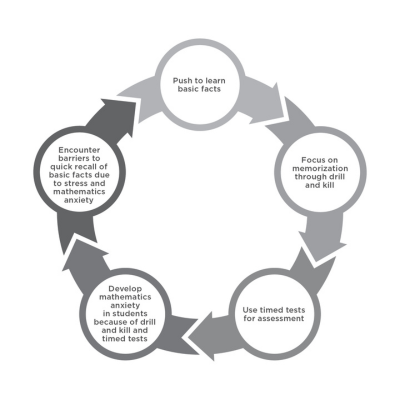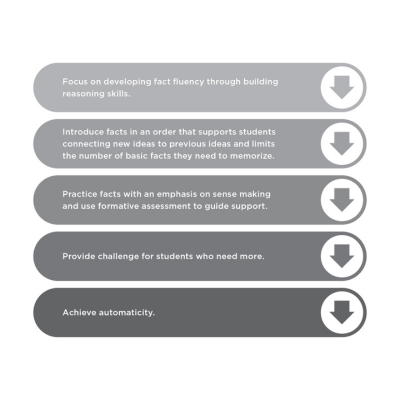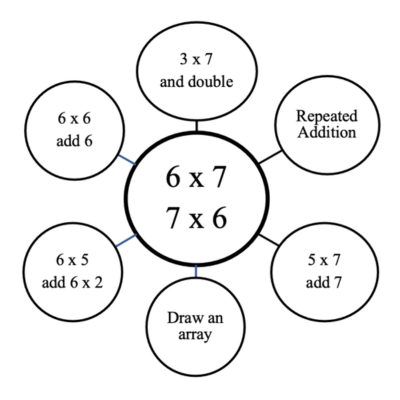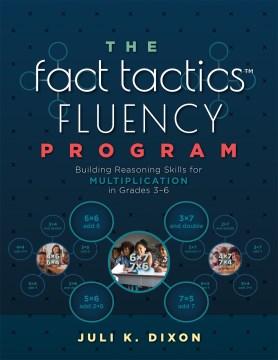

BLOGS > AUGUST 16, 2023
BY JULI K. DIXON

What is the product of 6 x 7? Did you automatically think 42? Teachers in Grades 3-6 spend substantial energy and time helping students to know facts like this automatically. There is little debate regarding the importance of having quick recall of basic facts. What is often up for debate is what to do about the students who continue to struggle to learn their basic facts (Sawchuk, 2023).
The solution to this dilemma is The Fact Tactics™ Fluency Program: Building Reasoning Skills for Multiplication in Grades 3-6 (Dixon, 2023).
According to Ms. Keyes, an assistant principal in a school that used this 20-week, step-by-step program, it is “intentional and easily accessible for teachers and highly engaging for students.”
How much of the anxiety students experience about mathematics can be attributed to time-pressured experiences used to memorize basic facts?
“Evidence strongly suggests that timed tests cause the early onset of math anxiety for students across the achievement range” (Boaler, 2014, p. 469). The resulting mathematics anxiety often serves as a gatekeeper to pursuing mathematics-related careers. Furthermore, if these techniques are successful, why do we need to focus on basic facts with the same students year after year (see Figure 1)?

Figure 1: Typical cycle for basic facts instruction (Dixon, 2023, p. 3).
How can we avoid causing anxiety in our students who struggle to develop their knowledge of the facts? Figure 2 provides an overview of the program that answers this question. This 20-week program is described in detail in The Fact Tactics Fluency Program (Dixon, 2023).

Figure 2: The Fact Tactics Fluency Program pathway (Dixon, 2023, p. 4).
Let’s return to 6 x 7. If you could not recall the product of 6 x 7 automatically, would you be more successful recalling that 3 x 7 is 21 and then doubling 21? The answer is likely yes. This is not automatic recall, but it is quick recall. There are many ways to determine the product of 6 x 7 that go beyond memorization (see Figure 3 for a web of ideas).

Figure 3: Strategies for determining the product of 6 x 7.
In some cases, thinking about facts using strategies is as important as automatic recall. Using these strategies helps students to develop a deeper understanding of mathematics. This understanding is prerequisite to success with algebra. Readiness for algebra requires “a grasp of the meaning of the basic operations of addition, subtraction, multiplication, and division. It must also include use of the commutative, associative, and distributive properties; computational facility; and the knowledge of how to apply the operations to problem solving” (National Mathematics Advisory Panel, 2008, p. 17). Thinking of 6 x 7 as 3 x 7 doubled is an application of the associative property of multiplication, as follows: 6 x 7 = (2 x 3) x 7 = 2 x (3 x 7).
You also might have derived the product of 6 x 7 by thinking of it as 5 x 7 plus 7 by applying the distributive property of multiplication over addition as follows: 6 x 7 = (5 + 1) x 7 = (5 x 7) + (1 x 7) = (5 x 7) + 7.
Encourage students to use strategies based on the application of properties of operations to determine the products of facts they don’t know. This helps students develop strong links between strategies and different facts. Assess students on their fluency with basic facts using self-assessment where students determine whether they know products of facts or if they are relying on strategies to determine them. These assessments help guide further practice without creating mathematics anxiety caused by timed tests.
When facts are introduced in a strategic order, and students use and practice strategies based on multiplicative reasoning to determine the products, students develop quick recall of basic facts and an understanding of the properties of operations. It is about being Fact Tactical.
“The Fact Tactics Fluency Program is a brilliant program that our teachers and students love! The order of facts and the specific embedded strategies help students make sense of multiplication and it provides prerequisite learning for a variety of standards. Our students have definitely improved in multiplication and are making connections across other math domains.”
–Melissa Logsdon, Numeracy Coach, Robertson County Schools, Tennessee

The FactTactics FluencyProgram
How can students achieve an understanding of multiplication that enables them to go beyond recall to explain their thinking? Author and mathematics education professor Juli Dixon introduces a program that teachers can seamlessly integrate into existing mathematics instruction. Learn six tactics to help you shift from an anxiety-producing, rote-memorization approach to one that helps students actually make sense of multiplication.

Juli K. Dixon, PhD, is a professor of mathematics education at the University of Central Florida. An active researcher, she has also taught mathematics at the elementary, middle, and secondary levels.
References:
Boaler, J. (2014). Research suggests that timed tests cause math anxiety. Teaching Children Mathematics, 20, 469–474.
Dixon, J. K. (2023). The Fact Tactics™ Fluency Program: Building Reasoning Skills for Multiplication in Grades 3-6. Bloomington, IN: Solution Tree Press.
National Mathematics Advisory Panel. (2008). Foundations for success: The final report of the National Mathematics Advisory Panel. Washington, DC: U.S. Department of Education.
Sawchuk, S. (2023, May 1). Kids need to know their math facts: what schools can do to help. Education Week.
An Author Interview with Drew Daywalt
June 27, 2025
Drew Daywalt, award-winning author of the best-selling The Day the Crayons Quit series, is about to release his second middle grade book with illustrator Mike Lowery, No Sam! and the Meow of Deception. The title continues the hilarious adventures of Sam...
Read more
An Author Interview with Adam Wallenta and Makana Wallenta
June 27, 2025
Get ready to rock the galaxy with the first volume of Punk Taco – a wildly imaginative, music-fueled sci-fi adventure from father-son duo Adam and Makana Wallenta. Created when Makana was just five years old, this award-winning graphic novel now debuts...
Read more
An Author Interview with Lisa Manuzak Wiley
June 27, 2025
A bewitching new graphic novel series is arriving this fall!Author-illustrator Lisa Manuzak Wiley, who grew up in Hawaii, blends cozy fantasy, sisterhood, and tropical charm in a heartfelt homage to her roots: The Witches of Pepperwood Bay Vol. 1. Lisa...
Read more
What We're Reading – Books to Add to Your TBR List
June 4, 2025
As a Follett Content Outside Sales Consultant, I’m not only an avid reader, but also a passionate book reviewer! I’ve curated my top 10 book picks that are perfect for adding to your To Be Read (TBR) list. These titles...
Read more
Author Joseph Koszary on the Changes Made to the International Baccalaureate Extended Essay
May 22, 2025
As someone who’s served as an extended essay coordinator, examiner, and supervisor, I’ve grown deeply familiar with the previous incarnation of the extended essay (EE). Like many of you, years of accumulated experience have made supporting students through the process...
Read more
Celebrate Literacy All Year Long: Host an Online Book eFair!
May 12, 2025
Reading and literacy are essential parts of our lives, and there are numerous events throughout the year dedicated to celebrating and promoting these important skills. Hosting a Follett Book eFair is a fantastic way to engage your school community, share the...
Read more